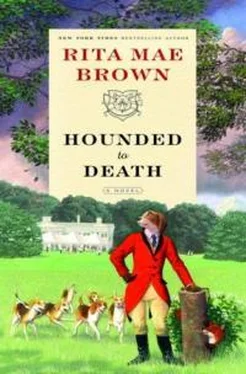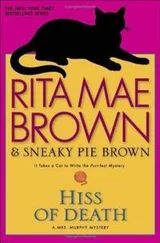“If our fox does that, I’ll not only meet your bet, I’ll give you an extra fifty.” Gray winked at Sister.
“I can feel that money sliding right across my palm.” Sister opened her neckerchief to put in more ice and grabbed an egg salad sandwich made by Bill Johnson. The Johnson family had joined recently.
Gray and Barry followed suit with the ice, but it didn’t occur to Mitch to do the same.
“We’re off. Next stop Shaker,” Betty said.
“He picked that northwest corner. He’ll be up and down ravines.” Mitch smiled, glad they had the southeastern corner of Skidby, with its generous rolling hills and flat pastures.
“Yeah, but it will be cool when he gets to the bottom.” Gray finished off his drink. “You know, we could institute a new tradition, a Gator to meet the hunt at checks.”
“Ha. You won’t be looking for Gatorade,” Betty teased. “Something stronger.”
“Fortifies the resolve.” Barry slapped Gray on the back.
After the ladies left, the team picked up some energy. The brief rest and drinks helped.
Barry, veteran of many a work party with Deep Run, knew people fell into a rhythm. Chatting can help the rhythm and so can singing, but the younger generations had not grown up singing as they worked. Tempted as he was to start the rounds he loved in the fields, songs he heard as a child and sang as a man, he figured it would make Mitch uncomfortable. Mitch wouldn’t know the words and would mistake the songs for slave ditties. Like many Americans, Mitch didn’t really know his country’s history. Field hands all sang. Color might determine the song, but it didn’t determine the singing.
Gray, who’d also grown up singing, whistled. That was his solution to the problem. After all, Mitch was the landowner, and no one wished to make him ill at ease.
All hunting depends on the generosity of landowners. A hunt cannot pay to hunt; the Master of Foxhounds Association forbids it. It’s a good rule that prevents rich hunts from driving out poor ones. Also, since farmers have to agree to allow their lands to be hunted, the contact brings a community closer together. Over time, landowners and foxhunters not only become friends but realize their political interests are identical. There is strength in numbers.
Barry was working alongside Mitch. “Never asked you. Why did you choose research instead of a practice?”
“Residency taught me I’m not good with people. I was fascinated by their symptoms but I lacked a good bedside manner. Hell, even Lutrell chides me about it.” He laughed at himself.
“Bedside manner to a woman means you worship her as a goddess.” Barry laughed. “Sure worked with Noddy.”
“What was her real name?” Mitch asked.
“Gertrude. She hated it. Didn’t even like Trudy, which I like. Her mother called her Noddy because she’d nod off to sleep in church.”
“Lutrell was named for her mother’s family. She never says much about it one way or the other, but have you ever met a Lutrell who was ashamed of being a Lutrell?” Mitch, not being old blood, thought it silly.
“No. That’s the southern way. If your mother’s maiden name can be used as a first name for one child, do it. Then use other family names, if they’re grand enough, for middle names. Or you can take the maternal names as the middle name. You know, Mitch, if you pay attention to someone’s name, you already know a lot about that person here.”
“What do you make of Mitchell Charles Fisher?”
Barry threw a tree limb off to the side of the trail. “Couple of ways to look at it. Fisher could be an Anglicization of Fisk or Fisker, Old Norse for fish or fisherman. Or it could be straight Anglo-Saxon. But it’s a name attached to a task, just as Wright or Carter is. The list is endless. Mitchell is a strong name, so your parents wanted you to be a strong man. Oh, the other thing about Fisher is it could be a Jewish name. Often the names from central Europe puzzled the men at Ellis Island so they gave the Jews more English-sounding names or the folks did it themselves once they lived here for a while. Diamond, for instance, is usually a Jewish last name.”
“Don’t think anyone was Jewish. It would be a help in my profession.” Mitch smiled. “You must have learned a lot, sitting on the bench. About people, I mean.”
“Sure did. I’d study the witnesses, study the defendant, the accuser, the lawyers. Even if the proceedings became tedious, my mind kept busy.”
“Miss it?”
“No.” The reply was forceful, and Mitch’s raised eyebrows elicited further response. “By the end my disgust level was so high I felt like retching.”
“Lawyers will do that to you.”
“That’s the rub, Mitch. Most lawyers are decent enough and a few are truly brilliant. Hearing their arguments, watching them shape a trial—and the great ones do—could be thrilling. It’s the flotsam and jetsam who come before the judge. Scum in a three-piece suit. People who commit evil and then want to wriggle out of it describes ninety-eight percent of the people I saw. My retirement day was one of the happiest days of my life.” He shook his head. “Enough of that. You picked research. Do you like it?”
“I do. I can help people, but I don’t have to deal with them.”
“What about the dogs?”
“What?” Mitch stood up straight.
“I’m a judge. I can find out anything. I know exactly what you do.”
“They’re not mistreated. And the work we do saves human lives.”
“Starving a dog seems like mistreatment to me.” Barry’s voice carried an edge.
“You can’t make an omelet without cracking eggs.”
“Human life trumps all other forms of life?”
Without a second’s hesitation, Mitch boomed, “Of course it does.”
“Those two sure have a lot to talk about,” Gray said to Sister. They had moved ahead of the others.
“Can only catch pieces of it.” Sister grunted, intent on leveling a stub in the ground with an ax. “I hate these damned things.”
“Yeah. Have to keep at them every year.”
“Mitch and Lutrell want to have a big breakfast the first time we hunt his fixture. Given that September can be bloody hot, what do you think about mid-October?”
“Perfect. The leaves will be turning, the pastures will still be green, and with any luck the air will be a bit crisp.”
“Luck is right. Sometimes you’ll get a seventy-degree day followed by a forty-eight-degree day. Changing temps make me feel like a shuttlecock.”
“Janie, I can’t imagine you as a shuttlecock.” He laughed.
They heard Barry’s cell ring but didn’t pay much attention until they heard a loud, “What?”
Mitch stopped too, for the expression on Barry’s face was one of intense attention.
Barry said, “How could they not know? That’s crazy.”
They all had paused in their work. Might be rude to eavesdrop but they couldn’t help it.
At last Barry flipped the phone shut. Sister moved toward him with Gray.
“Barry, are you all right?”
“Grant Fuller was found hanging in the freezer of one of his former slaughterhouses. Fonz called. He heard it on the local radio station. He’s in Arkansas, as you might remember. And how could they not see a man hanging from a meat hook?” He scanned the faces of the other three. “Fonz said Grant was found at the back of the freezer, which must be huge, and he’d been put in a large garment bag.”
“Good God!” Mitch exclaimed. “That really is crazy, hanging a man on a meat hook.”
“So he was preserved?” Gray inquired.
“Fresh as a daisy—according to what Fonz heard,” Barry added.
A pileated woodpecker, a huge bird sometimes close to two feet, sang its primitive song. Sister listened to the woodpecker, then ventured an opinion. “Maybe he wasn’t in the freezer all this time. I don’t care how big the freezer is at the slaughterhouse, someone would have noticed. He could have been on ice somewhere else and then moved. Why?” She shrugged. “Who knows, but these weird murders—and I swear to you-all that Hope was murdered also—are too much a part of the equine community, if you will.”
Читать дальше












